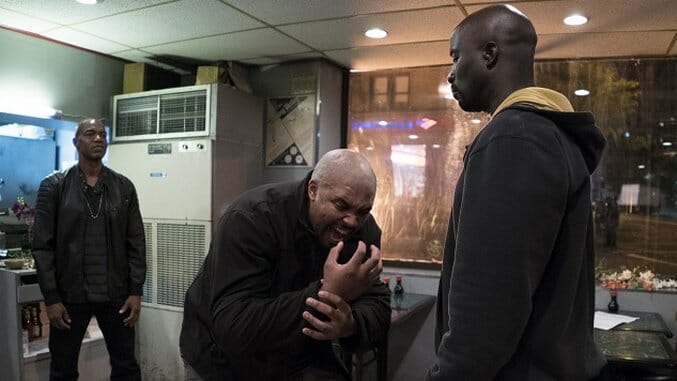More than a Great Superhero Show: Luke Cage Is About Black Identity, or Black Identities
(Episode 1.01 "Moment of Truth" and "Code of the Streets" Episode 1.02)

This review contains spoilers from the first two episodes of Luke Cage.
For the last six years or so, the Internet has been arguing with itself over whether television or film is a better creative space for storyteller types. We could, perhaps, memorialize this debate by erecting a monument in its honor, but there isn’t a grade of marble in existence that’s boring enough to fully capture its pedantic glory. Instead, let’s say this: That television can offer broad creative freedoms for both writers and directors if they know how to use it. Case in point? Marvel’s Luke Cage, a show that would easily have worked as a movie, but whose message would likely have been diluted by the shift in medium. In another universe, Luke Cage is merely “good.” In ours, it’s great.
It might even be the best title Marvel has produced since beginning its slow-rolling takeover of the entertainment business back in 2008. Let’s not mince words: Luke Cage doesn’t dick around. The show means business. The showrunner, Cheo Hodari Coker, means business. The show’s cast, which includes Mike Colter, returning to the role after debuting in 2015’s excellent Jessica Jones, plus Mahershala Ali, Theo Rossi, Alfre Woodard, Simone Missick, and the great Frankie Faison, mean business. Is your interest waning? Is the idea of a Marvel program that’s both serious and important not to your taste? If yes, well, let me break it down for you like this: Luke Cage is a series about a man with bulletproof skin and super strength battling criminals in Harlem, with a score that wouldn’t be out of place in a Gordon Parks film.
Or a Tribe Called Quest album (which, hey: there is a new one of those dropping sometime in the indeterminate future). Luke Cage is as much a product of the 1970s as the 1980s, to say nothing of now, in which America is roiling over Colin Kaepernick’s dignified form of protest, and reeling from a string of fatal officer-involved shootings across the country. What would Terence Crutcher have given to be Luke Cage on the night he died? How about Keith Lamont Scott? Tyree King? White superheroes get to swing over cityscapes with web shooters, they get to fly without aid of wings, they can teleport, they can see through walls, they wreath themselves in flames, and they shoot frickin’ laser beams out of their eyes. It speaks volumes that one of the most iconic black superheroes of all time is empowered to deflect the very thing that has taken, and continues to take, so many black lives over years, decades, and, most sobering of all, weeks.
So these are the two sides of Luke Cage: The side where it is the superhero narrative’s Black Lives Matter moment, and the side where Mike Colter knocks out bad guys, crusades against the gangster element on his home turf, romances a tough as nails detective who might just figure out his super secret and is generally awesome. The show has its pulpy genre cake and eats it, too, though the first two episodes—”Moment of Truth” and “Code of the Streets” —are a tad light on action. (Aside: Yes, those are Gang Starr song names.) We don’t get much in the way of Luke beats ass until the end of the former and sections of the latter, though we are treated to occasional gun violence and a good old fashioned meat and potatoes punitive beating, the latter set beneath the steady gaze of Biggie Smalls, immortalized in poster form.
That grim act of brutality is enacted at the hands of Cornell “Cottonmouth Don’t Call Me Cottonmouth” Stokes, quite literally in fact. Stokes is a gentleman mobster, a man of codes and limited compunctions about inflicting bodily harm on people who cross him, where “people” can range from threats to his business interests, or disorderly subordinates. He’s a bad dude, but the kind of bad dude who leaves you alone unless you piss him off. (But seriously, you don’t piss off a guy who has a lamp in his office that looks like the eye of Sauron.) As so often happens in fiction, Stokes is on a collision course with Cage, who, in the aftermath of Jessica Jones, now works for Pops (Faison), a barber and Harlem’s resident father figure, sweeping hair off the floor by day. By night he has a second job tending bar at Stokes’ nightclub, which fits his milieu, if not his sensibilities as a human being.
Can you see where their two paths might intersect? Maybe not. It takes a robbery gone wrong to set Cage and Stokes at odds with one another: When Shameek (Jermel Howard), one of Pops’ regulars, and Wilfredo (Brian Marc), one of Pops’ employees, try to make off with Stokes’ money in an arms deal, blood is rather graphically shed, and Luke Cage’s title bout is set on the show’s marquee. Coker respects the place Jessica Jones left Cage in. He’s trying to stay off the radar, hidden, recessed from society and into himself, all the better to heal after losing his wife, his livelihood, and his super rebound lover. (There’s also that whole matter of eating a shotgun blast at point blank range, which is enough to rattle even Cage.) But heroes like Luke can’t stay hidden. They have great power. Thus, as Ben Parker once told Peter, they have great responsibility. (Luke Cage has its own Uncle Ben moment, though to say more of it than that would be a dereliction of duty.)
-

-

-

-

-

-

-

-

-

-

-

-

-

-

-

-

-

-

-

-

-

-

-

-

-

-

-

-

-

-

-

-

-

-

-

-

-

-

-

-








































